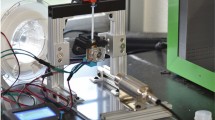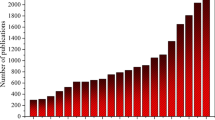Abstract
Polymer injection molds are generally manufactured with metallic materials, such as tool steel, which provide reliable working of molds and extended service life. The manufacture of injection molds with steel is a prolonged process because of the strength of steel. For a short prototype production run, one of the suitable choices could be the use of aluminum-filled epoxy material, which can produce a functional mold in a short time as compared with a conventionally machined tool. Aluminum-filled epoxy tooling is a good choice for short production runs for engineering applications, yet works best for relatively simple shapes. The advantages in relation to the fabrication of injection molds with epoxy-based materials include time saving in producing the mold, epoxy curing at ambient temperature, and ease of machining and post processing. Nevertheless, one major drawback of epoxy material is its poor thermal conductivity, which results in a relatively longer cooling time for epoxy injection molds. This study investigates some of the innovative ideas for enhancing the thermal conductivity for epoxy molds. The basic concept behind these ideas was to embed a highly thermally conductive metal insert within the mold between cavities with an innovative design of cooling channels called profiled cooling channels. This technique will increase the effective thermal conductivity of the epoxy mold, leading to the reduction in cooling time for the injection molded polymer part. Experimental analysis conducted in the current study also verified that the mold with profiled cooling channels and embedded metal insert has significantly reduced the cooling time.
Similar content being viewed by others
References
D. V. Rosato, D. V. Rosato and M. G. Rosato, Injection moulding handbook, 3rd ed., Kluwer Academic Publishers, Boston (2003).
C. M. Cheah, C. K. Chua and H. S. Ong, Rapid moulding using epoxy tooling resin, International Journal of Advanced Manufacturing Technology, 20 (2002) 368–374.
C. K. Chua, K. H. Hong and S. L. Ho, Rapid tooling technology, Part 1. A comparative study, International Journal of Advanced Manufacturing Technology, 15 (1999) 604–608.
J. C. Ferreira and A. Mateus, Studies of rapid soft tooling with conformal cooling channels for plastic injection moulding, Journal of Materials Processing Technology, 142 (2003) 508–516.
A. Ribeiro, N. Hopkinson and C. Ahrens, Thermal effects on stereolithography tools during injection moulding, Rapid Prototyping Journal, 10 (3) (2004) 176–180.
E. Sachs, E. Wylonis, S. Allen, M. Cima and H. Guo, Production of injection moulding with conformal cooling channels using the three dimensional printing process, Polymer Engineering and Science, 40 (5) (2000) 1232–1247.
L. E. Rannar, A. Glad and C. G. Gustafson, Efficient cooling with tool inserts manufactured by electron beam melting, Rapid Prototyping Journal, 13 (3) (2007) 128–135.
X. Xu, E. Sachs and S. Allen, The design of conformal cooling channels in injection molding tooling, Polymer Engineering and Science, 41 (7) (2001) 1265–1279.
K. Altaf, A. M. A. Rani and V. R. Raghavan, Prototype production and experimental analysis for circular and profiled conformal cooling channels in aluminum filled epoxy injection mould tools, Rapid Prototyping Journal, 19 (4) (2013) 220–229.
H. Hassan, N. Regnier, C. Lebot, C. Pujos and G. Defaye, Effect of cooling system on the polymer temperature and solidification during injection molding, Applied Thermal Engineering, 29 (2007) 1786–1791.
K. Au and K. Yu, Variable radius conformal cooling channel for rapid tool, Materials Science Forum, 532-533 (2006) 520–523.
H. S. Park and N. H. Pham, Design of conformal cooling channels for an automotive part, International Journal of Automotive Technology, 10 (1) (2009) 87–93.
K. M. Au and K. M. Yu, Variable distance adjustment for conformal cooling channel design in rapid tool, ASME. J. Manuf. Sci. Eng., 136 (4) (2014) 044501–044501-9. doi:10.1115/1.4026494.
H. Rees, Mold cooling, Mold engineering, 2nd Edition, Carl Hanser Verlag, Munich, Germany (2002) 282.
D. E. Dimla, M. Camilotto and F. Miani, Design and optimization of conformal cooling channels in injection moulding tools, Journal of Materials Processing Technology, 164-165 (2005) 1294–1300.
P. V. Vasconcelos, L. F. Jorge, R. J. Neto and P. Ricardo, Design epoxy resins based composites for rapid tooling applications, 5th International Conference on Mechanics and Materials in Design, M2D 2006, PORTO (2006).
Author information
Authors and Affiliations
Corresponding author
Additional information
Recommended by Associate Editor Khurram Altaf
Khurram Altaf is a Senior Lecturer in Universiti Teknologi PETRONAS (UTP), Malaysia. He obtained his Bachelor’s Degree in Mechanical Engineering and Master’s Degree in Mechanical Design Engineering. He achieved his Ph.D. in Additive Manufacturing/Rapid Tooling from UTP. He has several years of industrial and research/development experience before joining UTP. His research interests include rapid prototyping, rapid tooling, metal additive manufacturing, and advanced materials for additive manufacturing.
Rights and permissions
About this article
Cite this article
Altaf, K., Abdul Rani, A.M., Ahmad, F. et al. Determining the effects of thermal conductivity on epoxy molds using profiled cooling channels with metal inserts. J Mech Sci Technol 30, 4901–4907 (2016). https://doi.org/10.1007/s12206-016-1055-z
Received:
Revised:
Accepted:
Published:
Issue Date:
DOI: https://doi.org/10.1007/s12206-016-1055-z




